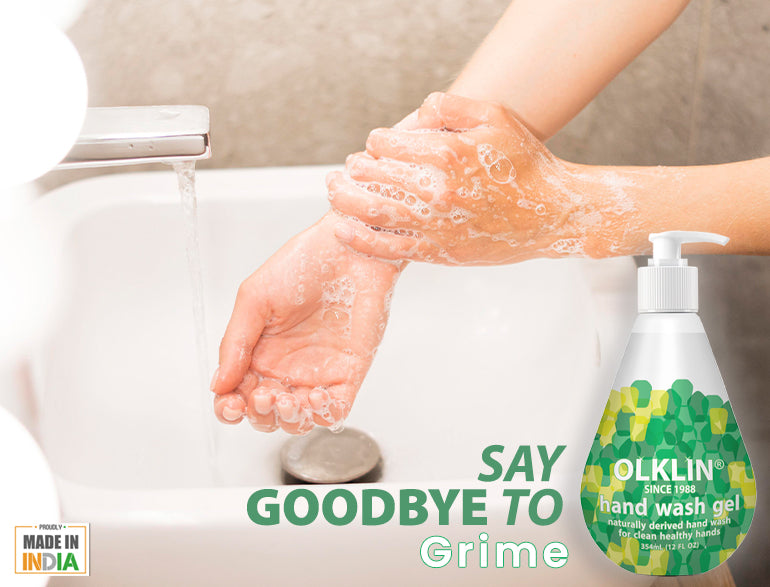Hand Wash Gel vs. Soap: Which Is Better for Skin & Hygiene?

When it comes to keeping our hands clean, two of the most common products we reach for are hand wash gel and traditional soap. Both are designed to remove dirt, bacteria, and viruses, but they work in different ways, and each has its unique set of benefits. So, which one is better for your skin and hygiene? Let’s break down the key differences between hand wash gel and soap, and help you decide which is the best option for you.

What is Hand Wash Gel?
Hand wash gel is a liquid-based cleansing product, usually thicker in consistency than liquid soap, often containing plant-based surfactants, moisturizers, and sometimes essential oils for fragrance. The texture and formulation of hand wash gels make them a popular choice for those seeking both gentle care and effective cleaning.
At its core, gel based Hand Wash works by breaking down oils, dirt, and other impurities on your skin. It can be both antibacterial and moisturizing, making it ideal for individuals who wash their hands frequently throughout the day. Many hand wash gels are pH-balanced, which means they are designed to be skin-friendly and gentle, ensuring they won’t dry out your hands with repeated use.
What is Traditional Soap?
Traditional soap, whether in bar or liquid form, has been around for centuries. It’s made by mixing fat or oils with an alkaline solution, usually lye, which produces a chemical reaction that turns these ingredients into soap. The main purpose of soap is the same as hand wash gel: to cleanse the skin and remove dirt and germs. However, soap bars can sometimes be harsh on the skin, especially if they contain added chemicals or fragrances.
While some soaps are designed with added moisturizers, many can strip the skin of its natural oils, leaving it feeling dry after use. This can be particularly problematic for people with sensitive skin or those who wash their hands multiple times a day.
Key Differences Between Hand Wash Gel and Soap
1. Formulation
One of the main differences between plant based hand wash gel and traditional soap is the formulation. Hand wash gels are often made with plant-based cleansers, which are naturally derived ingredients that are gentler on the skin. In contrast, traditional soaps may contain more synthetic chemicals or harsh detergents, especially if they are mass-produced.
Our hand wash liquid, for example, is made with plant-based cleansers that not only leave your hands feeling clean but also soft and sublimely scented. It’s a dermatologically tested formula with a skin pH-neutral balance, meaning it’s designed to work in harmony with the natural oils on your skin, helping to preserve moisture and prevent dryness.
2. Moisturizing Effects
One of the biggest advantages of hand wash gels is that they are often moisturizing. Gels tend to contain best ingredients, which help to lock in moisture and prevent your hands from drying out after repeated use. This makes hand wash gels a good option for people who wash their hands frequently, whether at home, at work, or in public places.
On the other hand, traditional soaps—especially those that are not specially formulated—can leave your skin feeling tight or dry after use. This is because soap works by breaking down oils on your skin, and while this is effective at cleaning, it can sometimes strip the skin of its natural moisture.
For those with sensitive skin or those who struggle with dryness, our hand wash gel’s pH-neutral formula can help maintain your skin’s natural moisture balance, leaving your hands feeling soft and hydrated.
3. Skin Sensitivity
Soap, especially if it’s fragranced or contains harsh chemicals like parabens or phthalates, can be irritating for people with sensitive skin. If you have eczema, psoriasis, or other skin conditions, traditional soaps might cause flare-ups or discomfort due to their drying effects or potential allergens.
Hand wash gel is often a gentler alternative. Our hand wash gel, for instance, is made without parabens or phthalates, making it a safer choice for those with sensitive skin. It’s also cruelty-free and dermatologically tested, ensuring it’s gentle yet effective for daily hand washing.
4. Hygiene and Antibacterial Properties
Both hand wash liquid and soap are effective at cleaning your hands, but when it comes to antibacterial properties, it can vary by product. Many hand wash gels are formulated with antibacterial agents like alcohol or other disinfectants, which can help kill germs and bacteria more effectively than regular soap.
However, traditional soap is still very effective at removing germs and dirt from your hands when used properly (scrubbing for at least 20 seconds). While soap doesn’t typically contain antibacterial agents, it works by physically removing germs from the surface of your skin, making it a solid choice for everyday hand hygiene.
5. Convenience and Ease of Use
Hand wash gels often come in convenient pump bottles, making them easy to use and less messy compared to soap bars. Whether at home or on the go, hand wash gels offer a no-fuss solution for cleaning your hands quickly and effectively.
Soap bars, on the other hand, can be less convenient because they require a soap dish to keep them clean and dry between uses. Additionally, soap bars can get slippery or difficult to hold, especially when wet, and may not offer the same smooth lathering experience as hand wash gels.
6. Sustainability and Eco-Friendliness
While both gel based hand wash and soap can be Eco friendly options depending on the brand and packaging, hand wash gel typically comes in plastic bottles that are harder to recycle. However, many brands are moving toward Eco friendly packaging, offering refill options or using recycled materials to reduce environmental impact.
On the other hand, soap bars tend to have minimal packaging—often wrapped in paper or kept in simple cardboard boxes—which can make them a more environmentally conscious option if you’re looking to reduce plastic waste.
Which Is Better for Your Skin and Hygiene?
Ultimately, the choice between hand wash gel and soap depends on your individual needs and preferences. Here’s a quick recap to help you decide:
- For dry or sensitive skin: Hand wash gel, especially one made with moisturizing ingredients, is a great choice. It helps keep your skin soft and hydrated, while also providing a gentle cleanse. Our hand wash gel is dermatologically tested and pH-neutral, making it ideal for those with sensitive skin.
- For effective antibacterial protection: If you're looking for a product that kills bacteria and viruses more effectively, hand wash gel with added antibacterial ingredients may be the better choice. Many hand wash gels, like ours, offer powerful yet gentle cleansing with plant-based cleansers.
- For simplicity and eco friendliness: If you're looking for a minimalist approach and want to reduce packaging waste, soap bars are a solid, eco friendly option.
Conclusion :
Both hand wash gel and traditional soap have their advantages, but for those seeking a gentler, moisturizing, and effective product, hand wash gel often wins out. Our hand wash gel, with its plant-based cleansers, cruelty-free formulation, and pH-neutral balance, provides the perfect combination of skin care and hygiene, leaving your hands clean, soft, and pleasantly scented after each wash.
Looking for effective cleaning solutions? We’ve got you covered! In addition to our Hand Wash Gel, we also offer a complete range of cleaning products, including floor cleaner, all-purpose liquid, scale removing liquid, bathroom cleaner, Hand Soap Lotion, Laundry Detergent, glass cleaner, fabric softener, dish wash, acid-free toilet cleaner, blocked drains cleaner, and concentrated clean linen bleach. Everything you need for a spotless home, shop and office!
TAGS:


